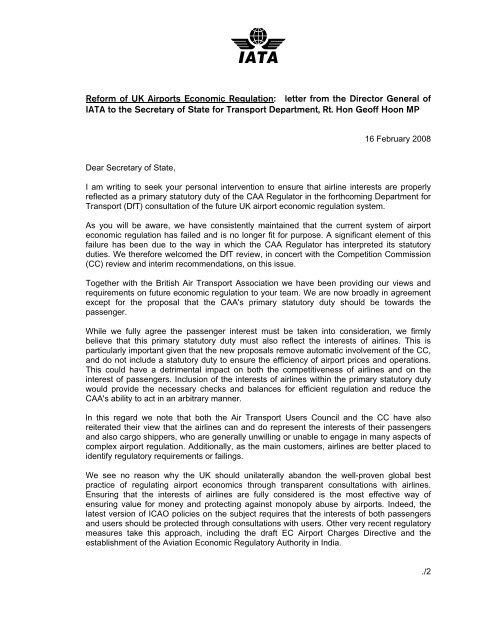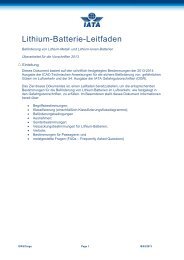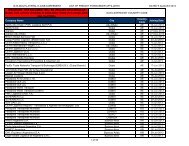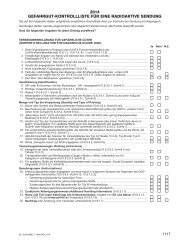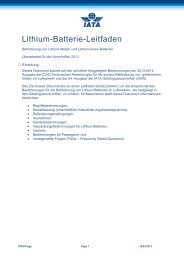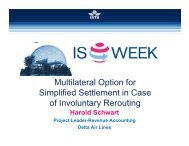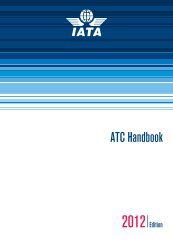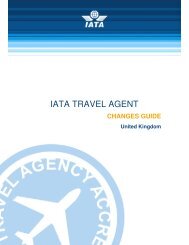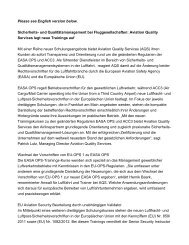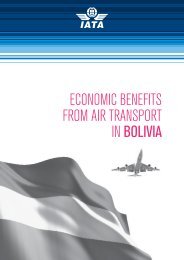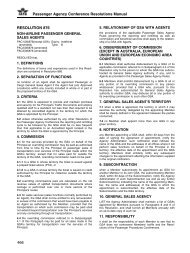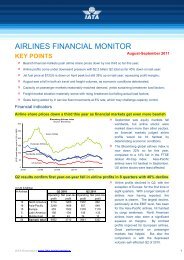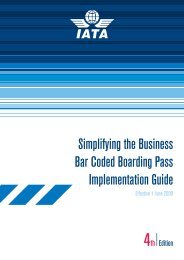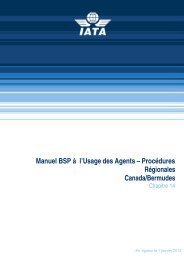Reform of UK Airports Economic Regulation: letter from the ... - IATA
Reform of UK Airports Economic Regulation: letter from the ... - IATA
Reform of UK Airports Economic Regulation: letter from the ... - IATA
Create successful ePaper yourself
Turn your PDF publications into a flip-book with our unique Google optimized e-Paper software.
<strong>Reform</strong> <strong>of</strong> <strong>UK</strong> <strong>Airports</strong> <strong>Economic</strong> <strong>Regulation</strong>: <strong>letter</strong> <strong>from</strong> <strong>the</strong> Director General <strong>of</strong><br />
<strong>IATA</strong> to <strong>the</strong> Secretary <strong>of</strong> State for Transport Department, Rt. Hon Ge<strong>of</strong>f Hoon MP<br />
16 February 2008<br />
Dear Secretary <strong>of</strong> State,<br />
I am writing to seek your personal intervention to ensure that airline interests are properly<br />
reflected as a primary statutory duty <strong>of</strong> <strong>the</strong> CAA Regulator in <strong>the</strong> forthcoming Department for<br />
Transport (DfT) consultation <strong>of</strong> <strong>the</strong> future <strong>UK</strong> airport economic regulation system.<br />
As you will be aware, we have consistently maintained that <strong>the</strong> current system <strong>of</strong> airport<br />
economic regulation has failed and is no longer fit for purpose. A significant element <strong>of</strong> this<br />
failure has been due to <strong>the</strong> way in which <strong>the</strong> CAA Regulator has interpreted its statutory<br />
duties. We <strong>the</strong>refore welcomed <strong>the</strong> DfT review, in concert with <strong>the</strong> Competition Commission<br />
(CC) review and interim recommendations, on this issue.<br />
Toge<strong>the</strong>r with <strong>the</strong> British Air Transport Association we have been providing our views and<br />
requirements on future economic regulation to your team. We are now broadly in agreement<br />
except for <strong>the</strong> proposal that <strong>the</strong> CAA's primary statutory duty should be towards <strong>the</strong><br />
passenger.<br />
While we fully agree <strong>the</strong> passenger interest must be taken into consideration, we firmly<br />
believe that this primary statutory duty must also reflect <strong>the</strong> interests <strong>of</strong> airlines. This is<br />
particularly important given that <strong>the</strong> new proposals remove automatic involvement <strong>of</strong> <strong>the</strong> CC,<br />
and do not include a statutory duty to ensure <strong>the</strong> efficiency <strong>of</strong> airport prices and operations.<br />
This could have a detrimental impact on both <strong>the</strong> competitiveness <strong>of</strong> airlines and on <strong>the</strong><br />
interest <strong>of</strong> passengers. Inclusion <strong>of</strong> <strong>the</strong> interests <strong>of</strong> airlines within <strong>the</strong> primary statutory duty<br />
would provide <strong>the</strong> necessary checks and balances for efficient regulation and reduce <strong>the</strong><br />
CAA's ability to act in an arbitrary manner.<br />
ln this regard we note that both <strong>the</strong> Air Transport Users Council and <strong>the</strong> CC have also<br />
reiterated <strong>the</strong>ir view that <strong>the</strong> airlines can and do represent <strong>the</strong> interests <strong>of</strong> <strong>the</strong>ir passengers<br />
and also cargo shippers, who are generally unwilling or unable to engage in many aspects <strong>of</strong><br />
complex airport regulation. Additionally, as <strong>the</strong> main customers, airlines are better placed to<br />
identify regulatory requirements or failings.<br />
We see no reason why <strong>the</strong> <strong>UK</strong> should unilaterally abandon <strong>the</strong> well-proven global best<br />
practice <strong>of</strong> regulating airport economics through transparent consultations with airlines.<br />
Ensuring that <strong>the</strong> interests <strong>of</strong> airlines are fully considered is <strong>the</strong> most effective way <strong>of</strong><br />
ensuring value for money and protecting against monopoly abuse by airports. Indeed, <strong>the</strong><br />
latest version <strong>of</strong> ICAO policies on <strong>the</strong> subject requires that <strong>the</strong> interests <strong>of</strong> both passengers<br />
and users should be protected through consultations with users. O<strong>the</strong>r very recent regulatory<br />
measures take this approach, including <strong>the</strong> draft EC Airport Charges Directive and <strong>the</strong><br />
establishment <strong>of</strong> <strong>the</strong> Aviation <strong>Economic</strong> Regulatory Authority in India.<br />
./2
- 2 -<br />
Whilst protection <strong>of</strong> <strong>the</strong> passenger interests is vital, we are not aware <strong>of</strong> any airport economic<br />
regulatory regime in any o<strong>the</strong>r major country that places <strong>the</strong> interests <strong>of</strong> passengers in such<br />
a unique and explicit primary position as <strong>the</strong> <strong>UK</strong> now proposes. Regulatory bodies such as<br />
<strong>the</strong> Australian Competition and Consumer Commission and <strong>the</strong> Commerce Commission in<br />
New Zealand have <strong>the</strong> interests <strong>of</strong> <strong>the</strong> consumer (passenger) in <strong>the</strong>ir mission statements.<br />
Their rulings have reflected this in <strong>the</strong> past, for example on <strong>the</strong> benefits to consumers versus<br />
<strong>the</strong> cost <strong>of</strong> regulation. However, <strong>the</strong>re is also a clear requirement to balance <strong>the</strong> interests <strong>of</strong><br />
all parties, notably airlines, as well as passengers.<br />
Our understanding is that <strong>the</strong> formal DfT consultation is likely to be issued shortly. I urge you<br />
please to ensure that <strong>the</strong> views expressed in this <strong>letter</strong> are addressed within <strong>the</strong> consultation<br />
document to avoid subsequent disagreement on a fundamental point <strong>of</strong> principle.<br />
We need to bury in <strong>the</strong> past <strong>the</strong> failed airport economic regulatory regime that has been an<br />
embarrassment not only to <strong>the</strong> <strong>UK</strong> but also <strong>the</strong> entire aviation industry. I am very keen that<br />
we should jointly ensure that <strong>the</strong> <strong>UK</strong> creates a best practice regime that is fit for purpose. So,<br />
I look forward to continued support and cooperation with you and your team to achieve this.<br />
Sincerely<br />
Giovanni Bisignani<br />
Director General and CEO<br />
<strong>IATA</strong> – International Air Transport Association<br />
Montreal – Geneva<br />
Cc:<br />
Mr. Willie Walsh – British Airways<br />
Mr. Nigel Turner – British Midland<br />
Mr. Steve Ridgway – Virgin Atlantic<br />
Mr. Daniel Bernstein – BATA


